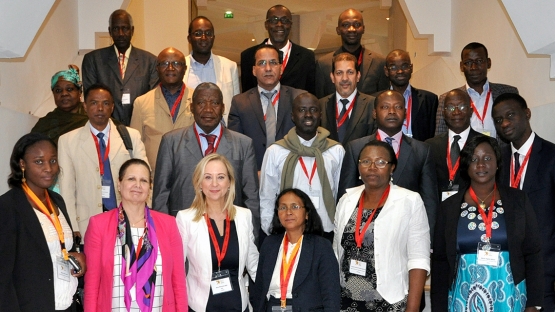Marrakesh, Morocco -- Senior cancer specialists and financial experts primarily from French-speaking African countries joined a workshop on 'Mobilizing Resources for Cancer Control in Africa' in a drive to increase urgently needed finances to fight cancer.
The pilot workshop was organized by the IAEA's Programme of Action for Cancer Therapy (PACT) with the support of the French Government, during the 10th International Conference of the African Organisation for Research and Training on Cancer (AORTIC) in Marrakesh, Morocco. It aimed to share state-of-the-art knowledge, skills and methods for effectively mobilizing resources for national cancer control programmes in Africa.
Professor Theophile Lincoln Tapsoba, Head of Nuclear Medicine at the University Teaching Hospital in Ouagadougou, Burkina Faso, said the workshop's timing was crucial. 'This event comes at a very important moment as we strive to provide adequate cancer services to our people,' he said. 'The workshop has truly broadened our horizons. We now have the necessary tools to convincingly discuss resource mobilization opportunities with all our partners, both at home and abroad'.
Infectious diseases continue to cause a lot of suffering in many parts of Africa, but cancer is now emerging as a leading cause of death on the continent. Annual rates of cancer are expected to rise by 69% over the next 15 years. Despite this alarming forecast, IAEA Member States in low and middle income countries find it very challenging to secure sufficient human and financial resources to provide adequate cancer control services.
Ms Anja Nitzsche-Bell, IAEA-PACT's Head of Resource Mobilization, outlined the need to develop robust and evidence-based resource mobilization strategies that build on a broad range of funding sources and supportive partnerships. 'Much of the world's attention has focused on controlling HIV, TB and malaria in Africa, even though cancer claims more than double the number of lives than these three diseases combined,' said Nitzsche-Bell. 'Looking at innovative and sustainable ways of securing funds is very important in order to address the rising cancer burden on the continent'. Ms Nitzsche-Bell presented potential options to explore, such as increasing allocations from general government budgets, social and private health insurance, private donor contributions, foreign assistance and specially targeted efforts to raise revenues from the public such as special taxes and levies.
Burkina Faso, Cote d'Ivoire, Cameroon, Madagascar, Mali, Mauritania, Morocco, Tunisia and Niger were amongst the IAEA Member States who attended, with additional participation from a wide variety of countries. Each had a keen interest in enhancing their cancer control capacities, and understanding the current developments and trends in financing global health which have profound implications for mobilizing resources for cancer control. Moreover, the event outlined key resource mobilization principles, strategies and advocacy methods.
'This workshop has provided a rare opportunity for cancer specialists and finance experts to appreciate different country's perspectives on budget allocation for cancer and other equally pressing national demands', said Mr Aristide Cyrille Dadie, Chief of Staff, Office of the Minister of Budget, Cote d'Ivoire. 'The important knowledge we have learnt will help ensure a more coordinated approach for our national cancer control initiatives'.


